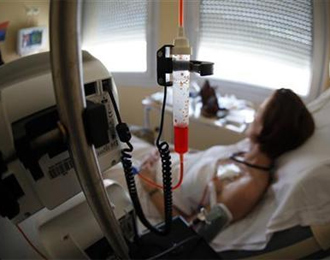
Cancer is more bad luck than bad behaviour study says
Miami: Cancer is often caused by the €œbad luck€ of random mutations that arise when cells divide not family history or environmental causes US researchers have said.
The study in the January 2 edition of the journal Science was led by researchers at Johns Hopkins University and based on a statistical model that includes many types of cancer in a range of human tissues.
However it did not include breast cancer which is the most common cancer in women or prostate cancer which is the second most common cancer in men after skin cancer.
In the adult cancers they did measure about two-thirds could be explained by random mutation in genes that encourage tumors to grow while the remaining one third was due to environmental factors and inherited genes.
€œWhen someone gets cancer immediately people want to know why€ said oncologist Dr Bert Vogelstein of the Johns Hopkins University School of Medicine in Baltimore who conducted the study with Johns Hopkins biomathematician Cristian Tomasetti.
€œThey like to believe there€™s a reason. And the real reason in many cases is not because you didn€™t behave well or were exposed to some bad environmental influence it€™s just because that person was unlucky. It€™s losing the lottery.€
He added that people who live a long time without getting cancer despite being long-time smokers or being exposed heavily to the Sun do not have €œgood genes€.
€œThe truth is that most of them simply had good luck€ he added.
The team sought to look at cancer in a new light by searching the scientific literature for information on how many times stem cells divided over the course of an average person€™s lifespan.
This process of self-renewal occurs naturally in the body and helps repopulate cells that die off in a specific organ. Researchers have long understood that cancer can arise when stem cells make random mistakes known as mutations.
But the study represents the first attempt at comparing how many cancers arise from this process compared to family history or environmental factors.
Some 22 cancer types arising in 31 tissues studied could be traced back to random mutations the study found.
The other nine €œhad incidences higher than predicted by €˜bad luck€™ and were presumably due to a combination of bad luck plus environmental or inherited factors€ the university said.
These nine types included lung cancer and skin cancer € which are influenced by exposure to smoke and sunshine € as well as some cancers known to be hereditary.
The findings mean that an even greater emphasis should be placed on early detection of cancer and research that could detect these harmful random acts before they lead to widespread cancer.
€œChanging our lifestyle and habits will be a huge help in preventing certain cancers but this may not be as effective for a variety of others€ said biomathematician Cristian Tomasetti an assistant professor of oncology at the Johns Hopkins University School of Medicine and Bloomberg School of Public Health.
For more news from Khaleej Times follow us on Facebook at facebook.com/khaleejtimes and on Twitter at khaleejtimes
Follow khaleejtimes ->

Legal Disclaimer:
MENAFN provides the
information “as is” without warranty of any kind. We do not accept
any responsibility or liability for the accuracy, content, images,
videos, licenses, completeness, legality, or reliability of the information
contained in this article. If you have any complaints or copyright
issues related to this article, kindly contact the provider above.


















Comments
No comment